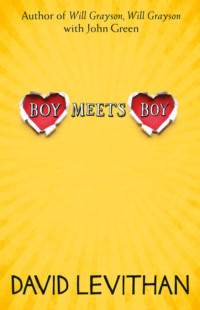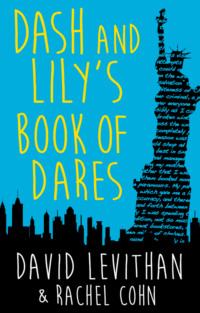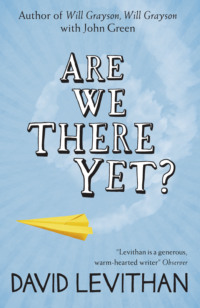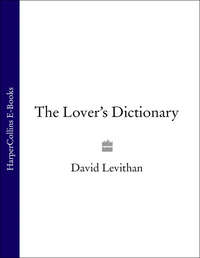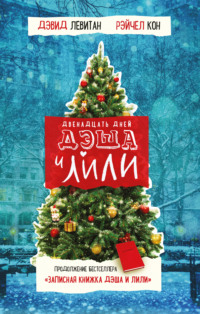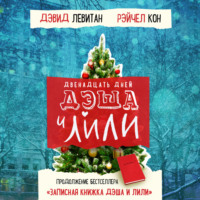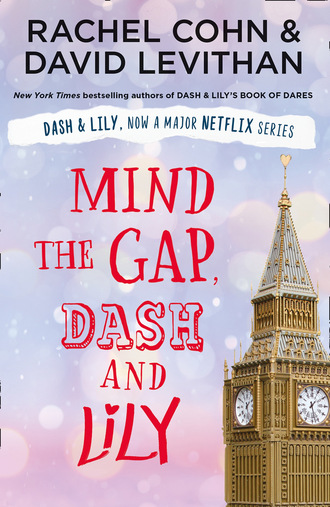
Suddenly the front door of the store swung open and in walked an older lady wearing a fancy suit, walking a cat on a leash. Ugh. Cat people. ‘Are we late?’ she asked loudly in a regal British accent, but like the kind that possibly could be a fake accent adopted by someone who is really from Sheepshead Bay, Brooklyn. A gentleman dressed in an elegant suit with a top hat followed behind her. He took off his hat with a flourish and tipped it in her direction. ‘Never, my dear,’ he told her. ‘The world waits for you.’
The gentleman was Dash. DASH! My sweetheart! His long hair was gone, and his face was clean-shaven. Looking cheerful. Smiling.
And suddenly I realized: That person I thought I knew best? I didn’t know him at all.
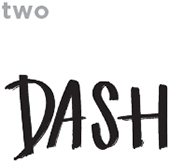
December 21st
This is the story of a boy who lost something, then found something, then had to figure out what to do next.
It starts off, strangely enough, with a sweatshirt, child’s- size medium.
I was seven, maybe eight. I got home from school, went to the kitchen for a snack, and found a box waiting on the kitchen table, covered in stamps that featured a woman I vaguely recognized as a queen. Even though she’d been postmarked and run a little ragged from the journey, her regal countenance didn’t waver. I admired that, and studied the package further, realizing with a shock and a thrill that my name was on it, which meant that it was for me.
‘It’s from your grandmother,’ my mother said when she caught me examining it. She said this with much more shock than thrill.
Immediately my young mind sizzled a connection, and for at least a few years after that, my mental image of my grandmother matched the face on the stamp. This was my father’s mother, a woman I couldn’t remember meeting in person. The things my parents said about her were not things I could fathom, starting with the fact that she’d left my grandfather because she’d fallen in love with a stone. I heard my mother explain this to her friends when my father wasn’t around; my grandmother had landed in England because she’d fallen in love with a stone. She hadn’t ended up with this stone (this made more sense to me), but it had been the reason for her to move to London, to start what my mother called ‘a new life.’ People always asked my mother which stone, and she said she wasn’t sure, that this had happened long before she came into the picture. It was only when I overheard one of these conversations later in life, in my early teens, that I understood what had happened. It wasn’t a stone she was chasing, but a member of the Rolling Stones.
She called every year for my father’s birthday. He answered dutifully, not enthusiastically. The phone would get passed to my mother, then to me. My grandmother always seemed to talk to me, but I never knew what to say.
She had sent toys and stuffed animals when I’d been born, and later I would uncover a photo of her holding my bundled baby body in her arms. This photo was not on display in our apartment; I had to dig into a baby book to find it, just like I had to dig into my parents’ wedding album to find another photo of her, beaming in a pink paisley dress as she gave my father away. (My grandfather and his new wife had skipped the wedding because of extensive golfing plans and a vague distrust of my father’s ability to choose wisely.)
I’d never received a package from her before, and its timing (nowhere near my birthday) made it extra tantalizing. She’d been overly generous with the packing tape, so there was no way for me to open the box without the intervention of my mother’s knife. The fact that the package had traveled over an ocean made it seem even more magical, and its contents did not disappoint – which means, I suppose, that they appointed. There were Cadbury chocolates, the likes of which I’d never experienced before. There were paperback editions of Roald Dahl with covers entirely unlike the American ones. There was a toy truck whose name I believed to be Laurie until my mother explained it was spelled a different way. Wrapped in the arts section from the Sunday Guardian, there was a piece of red felt that was revealed to be the northernmost tip of Paddington Bear. And then, at the bottom of the box, there was a sweatshirt with the Oxford University crest. I put it on immediately, and it fit perfectly.
Pinned to the sweatshirt was a short note.
I thought you might like these.
Consider it a gift for no reason.
Love, Grandmum
I was enchanted.
My father, when he came home, was more acerbic. ‘Are you kidding me?’ was his reaction when told about the package.
My mother insisted that I write a thank-you note, and I mustered up my finest penmanship to do so. Thus began a pattern that lasted for more than a decade: Out of the blue, my grandmother would send me a package, always with Cadbury chocolates and always with books, and I would reply with a thank-you note that gave her the slimmest of glimpses into my life alongside much more voluminous reactions to the books she had sent. This was how we corresponded. The relationship didn’t require much more than that, which suited both of us well.
In the meantime, my fantasy of Oxford set in. It was my literary utopia, a beacon of erudition in a world that seemed to increasingly despise the learned. Anytime a classmate disdained me or derided me, I imagined there were plenty of people at Oxford who would understand exactly what I meant. Every time my father or mother looked at me as if to say How did our merged DNA conjure this pedantic cypher?, I would picture a kind Oxford professor who would admire my inquisitiveness rather than be mystified by it or feel betrayed by it.
The downside of knowing this better place existed was the nagging, constant doubt that I would ever be good enough to be admitted through its gates. What if what I intended as profound insight was revealed to be mere bloviation? What if I read all the right books and surveyed all the right thinkers but couldn’t manage to string together the right words myself? There’s a thin, unpredictable line between aspirant and pretender, and it shifted so often in my mind that I never knew where I stood. As the application process began, it felt like the worst kind of reckoning – I could endure my schoolmates calling me pretentious or weird if my own idiosyncratic self-education came to be respected by the people I actually respected. But if Oxford said I didn’t pass muster? It would be devastating – and that was exactly what I was expecting in my dark, insecure heart.
Then, much to my surprise, they let me in.
My mother was with me when I found out, and she and I hugged and cried and felt as close as we’d ever been. Hours later, it hit her how far away I was going to be, which tinged her excitement with a certain eau d’empty nest. I waited two days to tell my father and only did so because there was no way of getting around it. He had his own life now, away from my mother and mostly away from me. I interrupted from time to time, to witness his foolhardy attempts at fatherishness. When I told him I’d been admitted to Oxford, he congratulated me – not with a hug, but with that simple word, congratulations. Then, almost in the same breath, he asked me how much it was going to cost. When I told him, he murmured something noncommittal, then asked me where else I’d applied. I’d given him the full list the previous time we’d dined, but I repeated it again, making the other options as lifeless as possible so my position would be clear.
Luckily for me, my father’s friends must have been impressed when he told them his son had gotten into Oxford; whereas I imagined a bastion of poets wrestling with their own despondency as a way of pulling the world out of its mire, my father and his friends saw a breeding ground for Future Leaders. Understanding the entitled direction that wind was blowing, I made my prime ministrations to my father along Future Leader lines, and after some cutthroat negotiations that got far more personal than they objectively needed to be, my parents worked out the tuition question.
It was only then, when I knew the dream was in fact coming true, that I told Lily. We had been assuming we’d both be staying in the New York area – she’d been admitted to Barnard and I’d been admitted to Columbia. Now I was mucking that up, and wanted to be sure I wasn’t mucking up our future as well.
I took her to Elephant & Castle to break the news over scones and tea. Perhaps because I had chosen a British-themed establishment for the delivery scene, she didn’t seem particularly surprised. It was incredible, really: She knew how much Oxford meant to me, and was thrilled on my behalf in a way that nobody else in my life had managed to muster.
‘But what about us being together in the city?’ I asked.
‘We can work it out,’ she promised. And I believed her in a way I’d never believe in myself. Because Lily always keeps her promises, even if she has to shoulder the world and bend time in order to do so.
We knew long distance would be hard, especially considering my disinclination toward the digital tether. I didn’t want to rely on texting and FaceTiming and writing witty, sweet comments under each other’s posts as a way of keeping the kindling under our love.
‘My favorite things about you are in-person things,’ I told Lily, and it was true. I promised to write her letters and to figure out a way for us to travel to Europe together before she started Barnard and I started my second year. I wasn’t going to be tempted to play the field or sow my oats; for me, Lily was the field, and she could have all of my oats. She didn’t fit perfectly into my new life, but the beauty of our relationship is that she hadn’t fit perfectly into my old life, either. Love teaches you that fitting is overrated; what you need to do is change the shape of your life to make the connection. We’d done it before; we’d do it again.
It was hard at first. I’d sit in my room and listen to Death Cab for Cutie’s ‘Transatlanticism’ (the song, not the album) on repeat.
I need you so much closer . . .
I’d write her letters on the backs of Oxford postcards.
I need you so much closer . . .
I’d call her to hear her voice, to hear what she had to say, to experience the reassurance of her hearing me.
This was during the first two weeks of school. Then, fiercely and relentlessly, Oxford took over my life.
The scenes on those postcards were the scenes I’d carried in my head ever since the sweatshirt had caused my curiosity to bloom. Verdant lawns and sophisticated cathedrals of learning. Gargoyle guardians keeping watch beneath cornices. Iron gates older than most of the books we’d read. Blackwell’s bookstore and the Bodleian Library, opening their shelves to the whims of genius and the genius of whims. The hallowed ground felt wide open, the citadel of knowledge entered at last. That was my postcard version.
The problem was that the postcards tended to show empty lawns, empty buildings. I hadn’t taken into account that there would be other people walking on these paths, crowding these gateways, pulling books from the shelves, talking loudly into their phones, and texting laboriously as if their minds and communication skills had been fully outsourced to Apple.
I had thought Oxford students would be more sophisticated, more intellectually grounded, more literarily impassioned than anyone else.
But it ended up that they were teenagers just like everyone else.
I hadn’t escaped the world after all. Instead, the world had infiltrated my ideal. I found some friends – kind and generous and bookish friends, for sure. But we were surrounded by petty, cliquish, self-entitled, self-branding, status-obsessed, neurotic, insecure, egomaniacal, interpersonally political, emotionally haphazard, academically specious, conversationally tedious humblebraggarts as well.
In other words, I had gotten to my dream place, and it only left me glum.
The university made rigorous demands, and I liked to think I was up to the tasks. I reveled in a poetry class I was taking and tried to muster my way elsewhere. When I got out of class, I wanted to go back to my dorm room to read; I would have been happy to spend the whole night reading. But my next-door neighbor, a future cabinet minister named John, was dedicated to inviting people over for lager and pontification. I played along, didn’t want to be the killjoy even if it meant sacrificing my own joy on the altar of alcohol and keeping face.
I started to sleep later and later, as if my body was willing itself back to New York time. I was honest with Lily about how hard it was, but I also made sure to tell my surroundings to her as if they were an interesting story, with compelling characters and narrative thrust. The fact that I myself didn’t feel this thrust? I tried to chalk it up to first-year jitters, even if that chalk was easily washed away under the sponge of any scrutiny.
I wasn’t rising to the heights I had expected. Nobody else around me seemed to be doing so, either – but for whatever reason, they didn’t seem to care.
I had sent my grandmother a rare non-thank-you note when I’d solidified my Oxford plans, to let her know we’d soon be sharing a country code. She’d called immediately after receiving the note, telling me I had to drop by her flat in Waterloo whenever I wanted.
‘Consider it your home away from your home away from home,’ she said in an accent that was mostly posh, but with traces of American charm underneath.
I’d thought I’d wait for a break to head Londonward, but after three weeks of Oxford, I phoned her and said I needed a brief escape; she told me she needed a little more warning for Saturday night plans, but that her Sunday was entirely free. I took the bus into ‘town’ and made my way to Roupell Street, a short walk from Waterloo Station along the South Bank. It was my first time in the city, and I got turned around repeatedly. Without my phone’s guidance, I probably would have ended up in the Thames. I was fifteen minutes late, but when my grandmother answered her red door on her quiet lane, she didn’t seem perturbed.
In person, she was not at all like the stamp version of the Queen. If anything, she looked like another kind of Queen, the type that could get into a rhapsodic tizzy over being bohemian. Her hair was a stylish shag, her clothes still in the same bright vocabulary as the pink paisley she’d worn to my parents’ wedding. The most striking thing, though, was how much she looked like me. We actually appeared more like each other than either of us appeared like my father. It was uncanny.
‘Oh, wow,’ she said after opening the door. ‘Would you look at that?’
Speakers throughout the flat were releasing the sound of George Harrison into every room. She bade me put down my bag in the hallway and immediately launched into a tour of the two floors, highlighting the guest room as mine for the duration of my time in the United Kingdom. Where I would have had shelves of books, she had shelves of vinyl. Her décor was very mod – she even had a chair that dropped from the ceiling in its own orb, hovering beside a lime-green couch.
Instead of sitting in the sitting room, she took me to the kitchen, where a late breakfast awaited us on an old wood table. As we sipped tea (hers ‘flavored’ with a ‘dab’ of whisky) and ate pastries, we caught up on the past nineteen years of my life without mentioning my parents in anything other than passing. When I felt I was talking too much about myself, I’d steer the conversation her way; she’d dole out a fact or two (she worked in the arts; she wasn’t seeing anyone in particular at the moment but had a few suitors), and then she’d steer the conversation back to me. I told her what I really thought about Oxford, and she didn’t scold me for ingratitude or tell me to get over myself. Instead she said, ‘Well, Oxford can only give you one part of your education; we’ll have to work on the rest.’
We stayed talking in her kitchen for hours. She told me she liked Lily, from the sound of her. And she told me she didn’t like my neighbor John, from the sound of him. Then, lastly, when we came to a natural pause, she told me, ‘I have to say, I like you very much, Dash. I’m so glad our paths have unfolded in this way.’
I felt glad; I felt grateful.
I returned to Oxford with an open invitation to London, and as the weeks passed and the walls of my dorm room seemed to close in on me more and more, I took my grandmother up on it frequently. She introduced me to her friends and took me to art exhibits, concerts at the Royal Albert, and theater on the West End. She told me to call her Gem, like her friends did; since I’d never really called her Grandmum out loud, it was an easy enough transition to make. When we met her friends or acquaintances, she always introduced me as her grandson, which didn’t particularly take my notice until Carl, one of her painter friends, said, ‘You have to understand how much that means; it’s the closest to acknowledging her age that I’ve ever seen Gem go.’
Gem and I never talked about my father, and I certainly never told him that I was seeing so much of his mother. When my own mother came to visit over Thanksgiving (since she had a break and I didn’t), I debated whether or not to take her to London. But Gem insisted (‘I always liked your mother, even if I questioned her taste in men,’ she quipped), and miraculously, Gem won over my mother as well. Before Thanksgiving, when Gem had told me, ‘You simply must stay for Christmas,’ I had thought, Yes, I simply must. Now my mother, who often went away for the holidays herself, understood my reasoning.
Lily didn’t take it as well. I called her, because I knew it would be something that required conversation, not the noël cowardice of a text or email. She didn’t try to hide her disappointment, and I appreciated that – we were still being entirely honest with each other, and all the long- distance trust was built on that. I offered to fly her over, but she said she needed to be with her family, and I couldn’t argue with that.
I missed her so much. The fact that I was staying for Christmas didn’t contradict that. I told her this, and told her I just needed to get my footing here. Oxford was battering my soul to a pulp, and London was the only balm I had for that. New York would have brought me Lily, but it also would have brought me a hundred other obligations. She said she understood.
A few days later, a homemade Advent calendar arrived in the mail. Her way of being here, and of helping me through.
Hallmate John and his Oxford cohort – led by Azra, Queen of Snide; Olivier, King of Glide – thought the Advent calendar was ‘cute’ . . . an adjective I sensed they usually reserved for animals that fit into a teacup. This cohort partied far harder than it studied, and they managed to be impressing the tutors far more than I was.
I refused to let them make me feel bad about Lily’s creation (though I did hide the gift certificate for cuddling far, far in the back of my sock drawer). I remembered that first box that Gem had sent me and decided to re-create it for Lily. I bought Cadbury chocolates, a toy lorry, some childhood-favorite tomes in their British dressings, and an Oxford sweatshirt. Not a gift for no reason but a gift for reason. I wrapped it in brown paper, tied it in string, and sent it across the ocean.
Then I stared down the hardest exams I’d ever faced. And instead of staring them into submission, I blinked. And blinked. And blinked some more. By the end of it, I felt like I was all eyelid and no pupil. And I must have looked gutted as well, because when I showed up on Gem’s doorstep immediately after my final exam, she took one look at me and said, ‘Oh, dear.’
‘I think I need to sleep for a few weeks,’ I told her. ‘Can you wake me up when it’s midnight on New Year’s, and then let me go back to sleep?’
‘You have four hours to nap,’ she replied, ‘and then I’ll wake you up with a plan.’
Precisely four hours later, there was a knock on my door. I was still too sleepy to know whether I called out ‘Come in’ or just thought about doing so. Either way, she came in.
She said, ‘I’ve looked into my crystal ball’ (this is what she called her smartphone), ‘and I believe I’ve found an event that will put the bubbles back in your champagne.’
‘Does it involve other people?’ I grumbled.
‘Certainly.’
‘Nooooooo,’ I replied, mostly to the pillow I was pulling over my face.
‘Dash,’ my grandmother said in her most leveling voice, ‘you must come to grips with the fact that you’d make a very inept monk. Tonight you get to be the dandy and I get to be the wayward contessa. And instead of teaming up to solve country-house crimes, we’ll go on a literary escapade. If that’s not a tonic for your ills, I don’t know what is.’
Even in my world-weary, sleep-deprived state, I had to admit that, put in those terms, it sounded like a pretty good plan.
‘You sound like Mrs. Basil E.,’ I mumbled, referring to Lily’s great-aunt, who also liked a proper turn of phrase.
‘Groovy,’ Gem said, dispelling any aura of Mrs. Basil E. that might have gathered, since I doubted highly that Mrs. Basil E. would have used that word even at the height of its innovation. ‘Now let’s get going.’
I groaned my agreement and peeked out from under the pillow to see my grandmother gripped by a fervor she usually saved for her love of Eric Clapton and David Thewlis and her loathing of Damien Hirst and the Tories.
‘Lovely!’ she chirped. ‘I’ll gather the accoutrements.’
Soon the Red Hot + Blue album – a favorite of hers – filled the air. I got out of bed and walked over to Lily’s Advent calendar, which had been the first thing I’d unpacked before my nap collapse. I looked at the doorway that led to today’s gift and felt I didn’t yet deserve to open it; this was the drawback of an Advent calendar, because I felt that I actually needed to have done something on that day to be worthy of whatever small piece of affection Lily had packed inside. I figured I still had a few hours left and could open it when I got home.
Next I went into the bathroom and made the grave mistake of (a) turning on the light and (b) looking in the mirror. I knew, intellectually, that my aversion to finding an Oxford barber and my inability to find time for a haircut had led to a certain follicular expansiveness. But now I realized that I had veered from Bright Young Thing territory straight into the land of Robinson Crusoe.
‘It’s time for a lather and a shave!’ I called out to Gem.
‘And how about a snip and a style when you’re through?’ she called back. (This was how I found out she’d worked for three years as a hairdresser at a posh salon.)
Two hours later, I bore a better resemblance to an older me, the one my university self had bamboozled, bedraggled, and balderdashed. Gem’s wardrobe included a few upscale suits that fit me beautifully. (This was how I found out she’d worked as a consultant to Liberty for two years.) She even had a top hat on reserve, left behind by a not-quite- gentleman who’d left her behind as well.
I went into my room and put on my duds; when I emerged, I found Gem in a similar suit of a much more flamboyant color.
‘Aren’t we just the pair?’ she said with a smile.
‘Swellegant, for sure,’ I parlayed.
If school had become a dirge, this was a blast of sonata. I half expected a carriage to be waiting for us when Gem opened the front door. But instead we rode on the Tube, reveling in the bemused looks we got from The General Population. I took a picture of us to send to Lily but didn’t have reception underground. I imagined Gem pulling out a third suit for Lily to wear and the three of us taking the town together. It could happen.
We got off at Marylebone and paraded to Daunt Books. I had spent a good amount of time at Waterstones Piccadilly, which looked like a flagship that had sailed in from the Jazz Age. Daunt, meanwhile, looked like a place where Jane Austen and Charles Dickens would have hung out to thumb- wrestle or brood on the state of the novel, such as it was.



